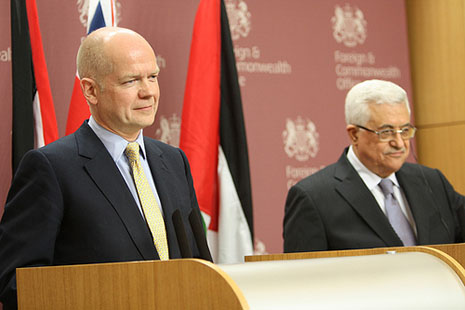THE current moment may reasonably be termed a crisis. A longstanding situation has become untenable but the attempt to deal with it is creating multiple tensions and prompting fears of an explosion of violence in the region. The Palestinians are seeking a radical change, Israel is resisting and claiming it would mean an end to direct negotiations for a settlement. The United States is supporting Israel’s objection to “unilateralism” and is prepared to veto a resolution endorsing a Palestinian state, even while dreading the consequences for its standing in the region. The Europeans fear that a UN vote may expose their divisions and finally discredit the idea of a common European foreign policy. Beyond these fears there is a fairly widespread apprehension that at a time of dangerous regional volatility, diplomatic moves may have entirely unpredictable consequences: unexpected outbreaks of violence, an escalation of tensions.
But could the crisis be turned into a moment of opportunity? In particular, does it not offer a chance to resume negotiations on a more satisfactory foundation, whereas the present framework, with the United States as the sole, ostensibly impartial mediator – though, at a deeper level, consistently in favour of Israel – is increasingly unable to move the “peace process” forward? The recognition of a Palestinian state does not entail the end of negotiations – a false alternative – and it should not be difficult for the Europeans to agree in pressing for their resumption, especially in view of the dangerous regional situation. The EU countries are also agreed on the “parameters” of an eventual settlement; where they differ is in their willingness to act against the wishes of the Israeli government. But even here, and in relation to other difficult choices that may arise, the diversity of perceptions and opinions may work to their advantage. It could make for more carefully considered policies than does the rather monolithic American policy “community,” which has had no difficulty in overcoming Obama’s initially heterodox intuitions in relation to the Palestinian issue – or, for that matter, in relation to Iran.
But why should Europe be able to succeed in restarting negotiations when the United States has been manifestly unable to do so? Before attempting an answer, it is necessary to examine another fundamental issue that Western policymakers and most commentators have been unwilling to confront. This is the fact that direct negotiations are bound to be fruitless if one of the parties rejects the ostensible aim of the negotiations. As Israeli historian Yehuda Bauer has recently maintained, Netanyahu’s diplomacy, his earlier record, and indeed his choice of coalition partners can best be understood as indications of his basic ideological commitment to Israel’s supremacy over the whole of Palestine. Thus, his goal is to prevent the two-state solution, long accepted by Israel as well as ly as the aim of the negotiations. To express this openly would mean the loss of all support and would alarm the Israeli electorate, so Netanyahu pretends to accept a Palestinian state while putting forward unacceptable preconditions for negotiating, as his diplomacy in Washington earlier this year made clear. Western policy-makers are reluctant to see this. Their recent diplomacy has focused on seeking to persuade the Palestinians to return to direct negotiations instead of going to the United Nations (as if the one excluded the other), seemingly oblivious of the reasons why the Palestinians have come to see this as fruitless.
The fundamental weakness in Western policy has been its longstanding toleration of Israel’s relentless construction of settlements on Palestinian territory. The not-infrequent Western protests have remained verbal, with no mention of sanctions or even a willingness to engage in a diplomatic confrontation with Israel. Obama initially appeared to make this a precondition for negotiations, but acquiesced in Netanyahu’s obdurate resistance; his diplomacy returned to a more familiar and comfortable posture, persuading and pressuring the Palestinians to resume negotiations in unfavourable circumstances – which, not surprisingly, proved short-lived and fruitless. Again, most recently, enormous diplomatic efforts have been made in seeking to persuade the Palestinians to avoid a confrontation at the United Nations. This effort has now failed. US diplomacy is trapped in its contradictions. Support for Israel – for the current Israeli government, that is – negates its endeavour to support the “Arab Spring” and diminishes its standing in the region and beyond. It is sad that Obama’s diplomacy has come to this.
There seems to be no good reason for the Europeans to support the United States in this seemingly contradictory and hypocritical stance – claiming to support a two-state solution but voting against a Palestinian state. Germany’s traditional role of supporting Israel in European diplomacy might leave it with no other option, but it may be hoped that in the ensuing discussions it will cease to equate supporting Israel with supporting every wish of its current government, however devious it may be. The European Union will not be so greatly damaged by another split vote. Chancellor Angela Merkel has rightly pointed out that the important thing is what happens after the UN vote. And here, at the time of writing, the available information is far more sparse.
It is not clear, for example, whether the Europeans, or for that matter the Americans, have sought to dissuade Netanyahu from taking the kind of provocative steps that have been threatened – withholding the transfer of taxes collected on behalf of the Palestinian Authority, proclaiming the end of direct negotiations or even declaring that the Oslo Agreements are no longer valid. Perhaps an awareness of regional volatility might restrain even this Israeli government, but Western diplomacy should not leave this to chance. There has been no mention of this in the public reporting, but it is clear that damage limitation must be an important aspect of Western diplomacy in the next phase.
Beyond this, is there a prospect of utilising the crisis as a diplomatic opportunity? Could the moment of danger be the occasion for a diplomatic breakthrough? Could there be a return to negotiations with more favourable prospects than before? This would not seem out of the question, but it could only be achieved against the will of the Netanyahu government. It would require, in the first place, a freeze and later an abandonment of construction in the settlements (perhaps excepting those to be transferred to Israel under the proposed “territorial swaps”) and later some form of monitoring to prevent wilful obstruction – in other words, a willingness to exert the maximum diplomatic pressure.
But is this credible, and could an effective strategy be devised? If the problem of the Netanyahu government’s real goals is directly confronted, such a reorientation of EU diplomacy becomes conceivable, even though little more than tacit support could be hoped from the United States. The more difficult question is whether an effective strategy could be devised. It is difficult to suppose that persuasion alone would influence Netanyahu, or that the kinds of pressure and sanctions usually considered would be acceptable to the Europeans. But the arts of diplomacy have been greatly diminished in the Cold War era and subsequently. Earlier, it was not so much a question of sanctions and the like, but more one of outmanoeuvring one’s adversary, or counterpart, leaving him or her with no better option than to act as one sought: one devious actor getting the better of the other. Could Netanyahu be placed in a position where ambition, and even the desire to remain in office, could lead him to opt for the role of the leader who achieves a historic settlement at the cost of his longstanding commitments and his preferred coalition?
His weakness is the gap between his real and his pretended goal. The challenge to diplomacy would be to exploit this, to make proposals that he would find difficult to resist but which would push negotiations in the desired direction. It may well be necessary to grasp the nettle of the settlements issue at an early stage, and here there might be a powerful message to the Israeli public, delivered by one or more of the main European leaders in the region itself, bringing out the strength of the objections to their continued expansion, as illegitimate not only legally but even more morally. These are no more than hints at an answer. More important is the question of how to become clear about the nature of the diplomatic challenge. The Europeans may well lack the power to coerce such a government, but they have a wealth of under-used diplomatic expertise that the ad hoc personal diplomacy of its leaders, and their approach to foreign policy in terms of electoral preoccupation, have left woefully neglected. •




